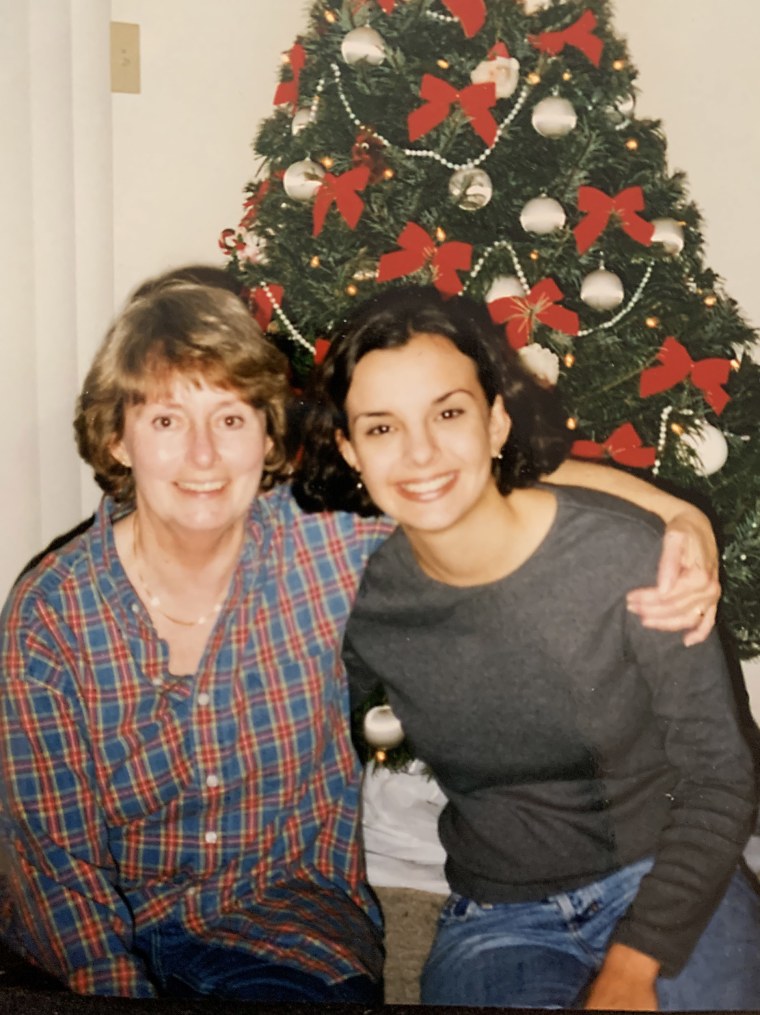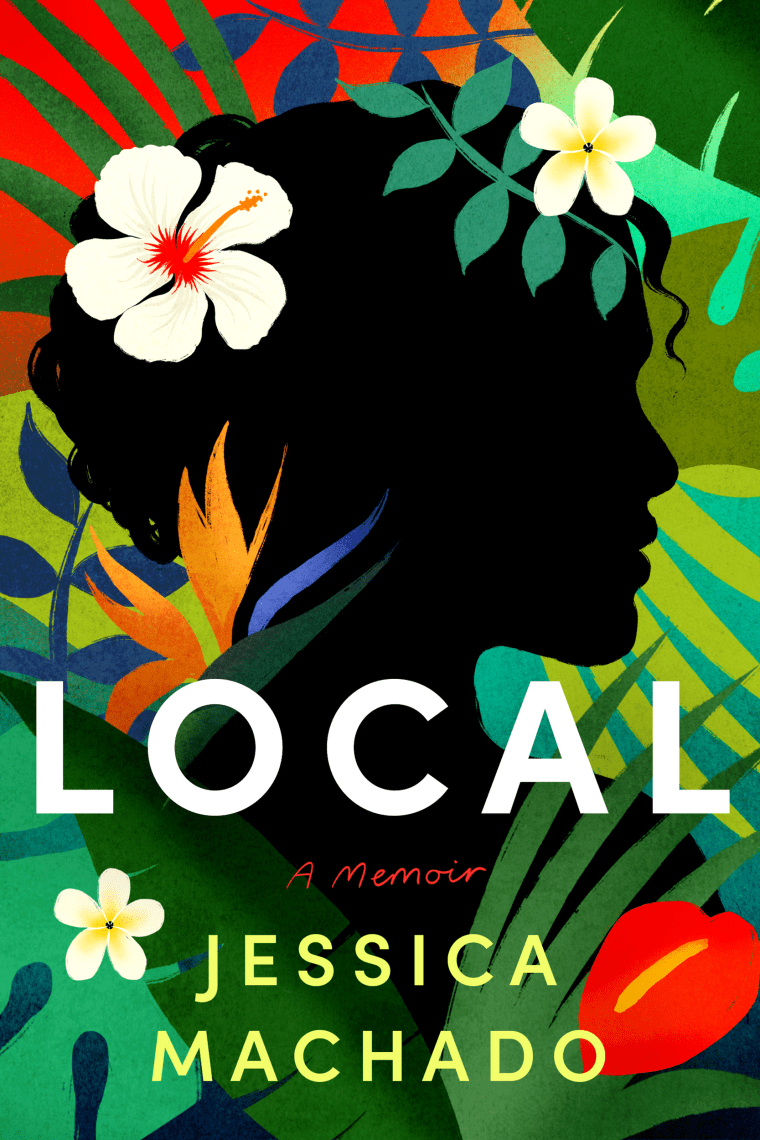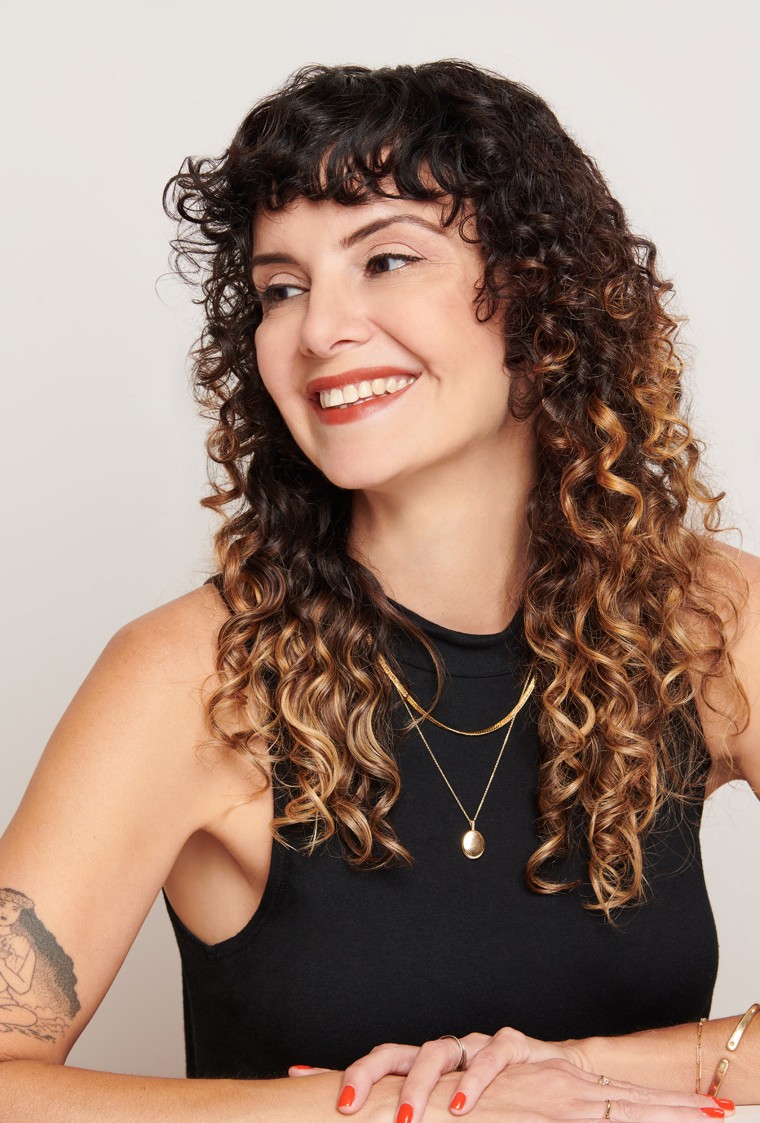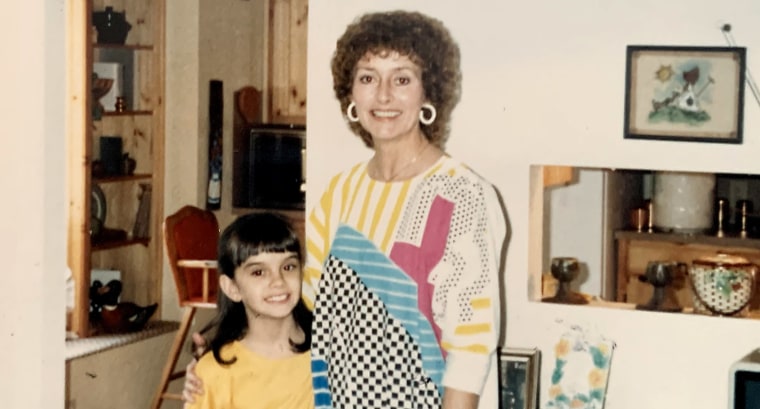Before I start a new job, I do what my mom would do. I buy a blouse. A billowy, floral print button-down, or maybe something with clean, classic stripes. As soon as I put it on, I feel put together, confident, ready to strut into my new role. I am my mother in all her '80s workingwoman glory.
But this is not the same feeling I have when I look in the mirror and see my mother’s face. You’d think finding her deep-set eyes in my reflection would comfort me, as it’s the only way I can physically come into contact with her since her death 20 years ago. Instead, as I creep into middle age, I am more focused on the translucence of my skin, the marionette lines around my mouth. They remind me of the things I’d rather forget about my mom — the fragility she tried to cover with layers of foundation, the mask of pretending “everything’s fine” weighing on her skin. How we both tried to hide our flaws and failed tremendously.
I am more focused on the translucence of my skin, the marionette lines around my mouth. They remind me of the things I’d rather forget about my mom — the fragility she tried to cover with layers of foundation, the mask of pretending “everything’s fine” weighing on her skin.
It also reminds me that no matter how self-aware or feminist I believe I am, no matter how much I admired her career or her fashion sense, I have ingested some sexist garbage about not wanting to become my mother.
It’s in the anti-wrinkle commercials: Don’t want your mom’s frown lines? Rub this on. It’s in the throwaway comments among my friends, annoyed at inheriting their mom’s neck rolls or the inflections in their voice. It’s in every silly reality show I watch, where 30-something faces never look more filled and sculpted than next to their mothers visiting from their hometowns. If we can’t financially do better than our boomer predecessors, at least we can look better, millennials and Gen Xers are told. We have a bevy of age-erasing tools at our disposal.

Before I go out and spend $500 on Botox, though, a healthier alternative would be to shift my mindset. Mostly, I’d like to disassociate my antiaging sentiment from my feelings about my mother. Is it too late?
Becca Levy, author of “Breaking the Age Code,” says we start internalizing negative messages about aging at around 3 or 4. In fact, studies show that the beauty industry actively targets women at younger and younger ages. This messaging is then constantly reinforced over decades — stay smooth, stay taut, keep people guessing your age. “It’s really hard to fight negative messages if we don’t realize that we’re encountering them,” Levy tells TODAY.com.

My mother, raised by mannered Southern Baptists in 1950s Louisiana, believed women over the age 35 should cover their “arm waddles.” Even after she moved to the sunny nonchalance of Hawai’i, where she met my father and raised me, she still abided by these rules of southern femininity. She didn’t own a tank top and never left the house without a full face of makeup. Relaxing about, she traded her signature blouses for looser tees, but often our way of spending time together was to cuddle on the couch and judge women’s choices — the soap opera heroines who dumped toxic lotharios for boring men, the celebrities who indeed did not “wear it best” in the pages of Us Weekly. Gossiping about strangers was fun, light and much easier than opening up about our own problems. I never told her how much I was teased in middle school because I didn’t think a former cheerleader and current fashionista would understand. Just like we never talked about why my dad was never home, or how she felt when he left her for another woman. Instead, she retreated to the lanai for a cigarette or retired early to her bedroom, reappearing in another freshly ironed outfit in the morning.
When I was in college, my mother was diagnosed with lupus, then breast cancer, leaving her bedridden most days. Still, she would heat up her curling iron before I’d visit and do her hair from bed. She’d queue up the past week’s soaps and hand me a stack of magazines. It was the way we had learned how to bond, but the performance had started to grate on me. Why is looking cute still a priority when you’re ill?, I thought to myself. Why are we talking about a character’s poor romantic decisions and not talking about how you will likely soon leave me?
But I never said anything to her. I didn’t want to make things ugly. Women often show we are strong by putting on a pretty face and holding it all in.
In some ways, that’s what bothers me most when I look in the mirror nowadays. Like my mother, my sadness or pain shines through, no matter how much moisturizer I lather on. When my anxiety is at its worst, I draw, smudge and redraw my eyeliner again and again to get it right. When my face looks saggy, I apply lipstick to brighten it up. The reflex isn’t to accept the life worn into my skin; it’s to pull it tight at my ears and plot a mini facelift. And I hate that I do that.

Levy says that we are not destined to just loathe our aging selves forever. “People are never too old to show the shift or to strengthen their positive age beliefs,” she says. This begins with actively seeking positive images of aging and redirecting any hate at the aging process toward ageism instead.
Research shows that people “who actively cope with ageism by confronting rather than ignoring it are less likely to develop depression and anxiety,” Levy writes in “Breaking the Age Code.” “Specifically, this applies to negative age beliefs: The more we challenge them, the less firm their grasp is on us.”
While it would do me good to cut down my viewing of enhanced Bravo faces, what helps me best reframe what I see in the mirror is understanding that my mother was a product of her culture — trained to be a ladylike southern belle — and I can rethink how I am one of mine.
Sure, I have the means and access to fill the under-eye bags my mom could not, and if I choose to fill them, that’s up to me. But I can also see my mother’s laugh lines in the mirror and remember how much we giggled over rom-coms as I laid in her lap. I can look into those deep-set eyes and embrace the vulnerability I wished I showed her. I can love all who she was, even the goofy, surface-y stuff. Most of all, I can stop being so hard on either of us.
Do you have a personal essay to share with TODAY? Please send your ideas to TODAYEssays@nbcuni.com.
